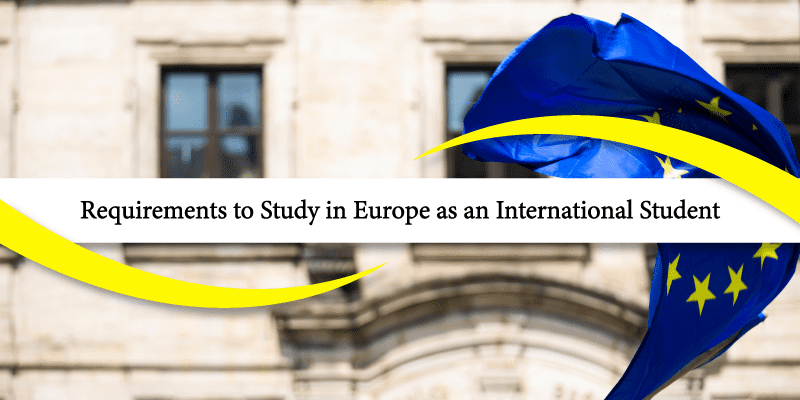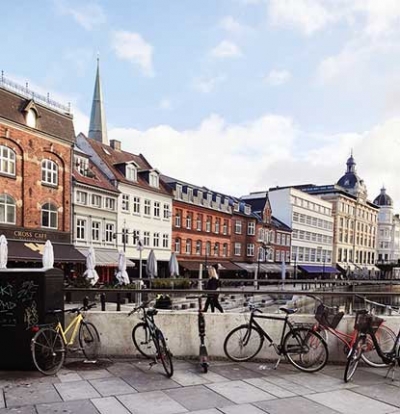Publish Date: 27th December 2021
You are here as you may be planning to pursue your higher education in Europe. Firstly congratulations on choosing to study abroad in Europe. You have made the right decision. Many international students from all over the world travel to study in European countries due to the high standard of education. To study in Europe you would require to assemble some important documents. This article presents you Requirements to Study in Europe as an International Student

Documents required for the admission application process
To apply for any of the universities in Europe, you need to send some important documents to the university’s graduate admission office. Only after processing the documents, only the Universities will issue an Offer letter. But the requirements may change from university to university and thus the question arises How to Apply to Study in Europe?. Here we have provided the list of documents required while applying to the study program in any University in Europe:
1. Application Form - The Application form is the entry that you need to fill accurately to get admission to your selected university. You can fill the application forms online or offline as available from the university.
2. Competitive Exam Scores - For obtaining admission to any European University, you need to submit the result of the language tests to prove your efficiency in that particular language. You might also be asked to take GRE/ GMAT exams.
3. Academic Certificates - You need to send the academic certificates in support of your educational qualifications. The Academic Certificates include
- SSC.
- Intermediate.
- Bachelor’s Degree with year-wise/semester-wise Marks lists.
- Bachelor’s Degree consolidated memorandum of marks.
- Bachelor’s Degree Provisional Certificate and Degree.
- Masters Degree with year-wise / semester-wise marks lists.
- Master Degree consolidated memorandum of marks.
- Masters degree provisional certificate and degree.
- Final semester project work details.
4. Statement of Purpose - Through SOP you need to tell them why you have chosen a specific course, why you opted for that particular university, what are your career goals, your interests, and other Personal Details. A well-established SOP can make your way into the university. Take this seriously: Things to Avoid When Writing A Statement Of Purpose
5. Letter of Recommendation - Admission officers always want to know what others think about you, to assess your qualities, characteristics, and capabilities. Hence they ask for a Letter of Recommendation form. Find the professor or manager who you know for sure to ask for a reference letter to nail an admission.
6. Work Experience Certificates - If you are applying for any Business Program you must have experience in the relevant field to get admission to any Business School in Europe. The main documents you can submit as proof of work experience are:
- Latest Salary Slip.
- Latest Joining Letter.
- Employment Certificates from all Previous Employers.
7. Resume - You need to send your resume that includes details like your educational background and skill sets. A powerful resume always impresses the admission officers.
8. Passport size Photographs - Though it looks easy to get, you need to concentrate on these photos. You need to submit the correct sized and latest photographs to apply.
9. Additional Documents - If you have any additional documents like Paper presentations, you can also submit them. Submit your certificates that will prove your talents and the extracurricular activities you have undertaken. This might be useful for you: 10 tips for Strong International University Application
Language requirements for Universities in Europe
Many universities in Europe offer study programs or courses in the local and/or English language. Some EU countries require proof of basic language proficiency as a norm for the university admission process. So, you have to appear for exams to test your language proficiency. The level of the test will differ according to the requirements of your course and visa. Also, note that these tests have a certain validity period. So, you have to consider that factor too, depending on the duration of your stay abroad.
For English taught courses
You can take any of these three English language exams
- IELTS Academic(International English Language Testing System)
- TOEFL iBT( Test of English as a Foreign Language)
- PTE Academic(Pearson Test of English)
For German taught courses
You can take any of these 5 German language exams:
- TestDaF - Test of German as a Foreign Language.
- DSH has almost a similar pattern as TestDaF. It is the German Language University Entrance Examination for International Applicants. The exam pattern differs from one university to another. It is conducted only at German universities.
- TELC tests
- GDS - Goethe Institute German Language Diploma.
- DSD - German Language Diploma of the Standing Conference of the Ministers of Education and Cultural Affairs, Level II
For French taught courses
You can appear for any of these 5 types of French language exams:
- DELF tests
- TCF
- TEF
- TFI
- TCF DAP
For Spanish taught courses
You can appear for any of these 3 Spanish language tests:
For Italian taught courses
You can appear for any of these 3 types of Italian language exams:
For Dutch taught courses
CNaVT is the official international exam for the Dutch language proficiency test. It has 5 different levels of exams. You can choose one that matches your requirement. The test includes 3 parts – reading and writing, listening, and face-to-face communication.
For Czech taught courses
You can appear for the CCE test. This tests your written and oral proficiency in the Czech language. It has three levels, basic, independent, and proficient users.
Student visa requirements to study in Europe for International Students
After receiving your admission application the university will verify the documents or profile and will send you the admission. Once you have received the acceptance letter you can apply for the Student Visa with the required documents. To apply for a student visa you will require the following documents:
- Entry visa application form
- Letter of acceptance from the European university
- Recent passport size photographs
- Valid travel documents
- Proof of accommodation in Europe
- Proof that the student has enough financial support to survive during your studies in Europe
- Paid health insurance
- Copy of all previous educational certificates
- Receipt of the visa application fees
For more information, check this out: Planning to Study in Europe? Here's All You Need to Know About Europe Visa
Financial requirements proof for student visa in Europe
If you’re coming to Europe, you will need to prove you have enough money to support yourself during your studies in Europe.
- A copy of an account statement. This copy is not older than 3 months.
- If you have obtained any scholarships, you should show that you have sufficient funds to study in Europe by submitting a scholarship declaration.
- You can also deposit the required amount in the bank account of your University.
- Someone abroad funds your study and stay. You need An original statement of financial support from them.
We hope this article was helpful for you. For any additional details, you can visit the website of the university you have chosen to study in Europe. There you get the exact list of requirements of documents for your chosen course and visa documents list. You can contact us for any queries. Feel free to reach us.!!
You should not miss the following articles
Best European Countries to Study Abroad by Various Factors
Duolingo, an application for learning different languages
Why is Budget Management Important for Students Studying Abroad?






 Study in Europe
Study in Europe
Categories: Europe
Tags: Study Abroad